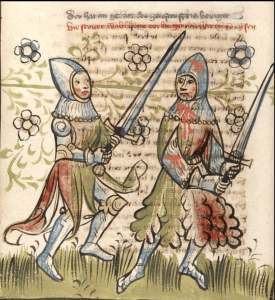Germany
10th century CE
Walthariuslied
It seems almost ironic to realize that the older some of the heroic epics from the pre-modern era are, the more appealing they seem to be. Beowulf, the “Hildebrandslied,” El Poema de Mío Cid, the Chanson de Roland, the Nibelungenlied, and others all prove to be monumental in their plot development, the hero’s character portrait, the hidden psychology driving the action, the narrative development, and even the subtle wit or irony, even in the face of deadly dangers. All this and more also applies to the Walthariuslied, a tenth-century Latin poem that consists of 1455 hexameters and appears to be based on various oral sources, although details escape us.
There are some thematic connections with the Old English Waldere (8th–10th centuries) which has survived in only 63 verses in which we learn some details about Walter and Hildegund, the protagonists in the Walthariuslied, or Song of Waltharius. There are some good though not completely conclusive arguments that the learned monk Ekkehard IV of St. Gall (ca. 980-after 1057), head of the monastery school of St. Gall, might have been familiar with our text since he says in his Casus sancti Galli (ch. 80) that he had improved, on behalf of Archbishop Aribo of Mainz (or another person), a Vita Waltharii, which had been allegedly composed by Ekkehard I (d. 973), the author of the well-documented Gesta Berengarii (ca. 915-ca. 926). This in turn reflects knowledge of the Waltharius: “He also wrote in meter for his teacher during his school years … the life of Waltharius ‘Strong-Hand,’ which I personally corrected in Mainz” (Ring, ed. and trans., 9). The monk Herimannus of St. Gall, who authored the younger Vita of Saint Wiborada (ca. 1075) as a homage to Ekkehard I and his older Vita, quoted the verse 51 from Waltharius.
All this could be questioned, however, since there are a number of inconsistencies and problems in the references, and since the prologue includes the name of a “Geraldus” as the composer of this work. The scholarly debate about this thorny issue has still not been resolved, so we do not know for sure the poem’s origin (St. Gall or Strasbourg, for instance) or approximate date (if Ekkehard I, ca. 930; if Gerald, ca. 990). Altogether, we can agree, however, that this poem belongs generally to the world of Carolingian (or post-Carolingian) culture and represents a secular text curiously written by a monk for a bishop or an archbishop. The large number of manuscript copies or fragments confirms the great popularity that Waltharius experienced.
Following the prologue, we learn of the history of the mighty Huns under their ruler King Attila who had successfully conquered even the Franks and had forced their King Gibicho to hand over a hostage. Since the king’s son Gunther was still too young, they sent noble Hagen, along with massive treasures. The Huns then attacked Burgundy and forced the local King Hereric to do the same, who then sent his daughter Hildegund. Subsequently, the kingdom of Aquitania becomes Attila’s victim, and the King Alphere hands over his son Walter as a hostage. The Hunnish ruler treats these three princely children in a fatherly fashion, and his wife Ospirin takes good care of the girl. Here the poem takes a leap over a good number of years.
After Gibicho’s death, his son Gunther ascends to the throne and immediately cancels the treatise with Attila. As soon as Hagen learns that news, he escapes from his exile and returns home secretly. Walter and Hildegund, however, stay behind because they have to wait for a better opportunity. Ospirin is the first to realize this new development and advises her husband to shower Walter, who has risen in the meantime to a mighty warrior and military leader, with treasures and to offer him marriage to the daughter of one of his vassals. Walter convinces him, however, that he cannot afford to turn his attention away from his military duties in the king’s service to conjugal life. In reality, however, he is planning his own escape together with Hildegund with whom he becomes betrothed immediately after he has returned from the battlefield.
First, Walter makes sure to defeat a riotous people and thus secure once again a military victory for Attila. Then, the two prepare their flight, taking with them much treasure and also fishing hooks and other utensils to procure food during their journey. Walter organizes a huge celebration and gets the entire court completely drunk, which allows the two to sneak away unobserved and gain enough distance from the Hunnish lands before their escape is eventually discovered. Again, Ospirin immediately understands what has happened once she has sobered up, and deeply laments that with the loss of the two exiles, the Hunnish empire will be at risk. The two young people manage to make their way to the west by traveling at night and hiding during the day, and Attila’s knights are too afraid of this mighty warrior to follow in pursuit. The narrator emphasizes that Walter secures enough food by catching birds and fish, but he abstains from any intercourse with the maid.
The heroic theme gains full attention only after the two fugitives have crossed the Rhine River. Walter had paid the ferryman with fish he had caught before, and the ferryman sells them to King Gunther’s chief cook. Such fish, however, do not exist in the kingdom, and once Hagen has learned about the mysterious travelers, he immediately realizes with great joy that Walter has returned. Tragically, however, Gunther wants to rob the refugee both of his Hunnish treasure and his maid. Hagen fails to sway him away from that evil plan, although he knows how awesome and terrifying Walter can be in military confrontations. Nevertheless, Hagen has to accompany Gunther along with eleven other knights in their search for the Aquitanian warrior, who has found refuge in a cave in the Vosges Mountains in modern-day northeastern France to catch up on much-needed sleep.
Upon Hagen’s advice, Gunther sends one of his men, Camalo, to the stranger to learn his identity, but haughtiness and arrogance determine the knight’s demeanor who demands that Walter turn over all his treasure and the maid. Honorably, Walter rejects this completely, but offers a great gift for the king, which greedy Gunther in turn finds insulting. Hagen strongly advises him to accept the gift, especially since he has seen in a vision during the previous night that a bear had bitten off the king’s leg and then one of his own eyes and some teeth. Gunther has only contempt for that warning and sends the same knight to fight with Walter.
As expected, Camalo dies at Walter’s hand, and so do all the other eleven warriors. The narrator strongly condemns Gunther for his insanity to challenge that mighty warrior (754-55), while he has Walter laugh about the foolishness of his opponents whom he has to kill in self-defense. Hagen watches from the distance, in horror, especially when his own nephew, Patavrid, enters the fray, disregarding his uncle’s warning, and is slain. The other warriors face the same destiny, helpless against the mighty hero Walter.
Finally, Gunther implores Hagen to help him to overcome the enemy, although the latter feels deeply hesitant to fight against his own comrade from their exile. But he submits under Gunther’s pleas and conceives of a plan to lure the warrior out of his safe cave and thus catch him by surprise. After Walter and Hildegund have rested, they depart in the hope of getting away, but Hagen and Gunther ambush them, which forces Walter into his last stand. Gunther bursts out in vile and haughty language, which Walter disregards, but he approaches Hagen and reminds him of their old friendship which should keep him from fighting against him. Since Walter has already killed so many of his own comrades, Hagen explains that he cannot stay away any longer. The three men then enter a deadly fight, the result of which is that Walter cuts off the king’s leg, Hagen cuts off Walter’s hand, and the latter cuts out Hagen’s right eye, slices off his lips, and breaks out some of his teeth, just as Hagen had foreseen in his vision.
This ends all fighting, and Hildegund treats their wounds and refreshes them with wine. The three men then (re)establish friendship amongst them while mocking each other’s physical handicap. The bloody heroic poem suddenly turns to black humor for a short moment, but then the two Franks return to Worms and Walter bends his way to his home country, Aquitaine, where he marries his bride and rules the country for thirty years.
Although a fairly short heroic epic poem, Waltharius proves to be a literary masterpiece even modern readers can fully enjoy. There are many subplots, fascinating character portraits, and strong efforts to psychologize Hagen’s suffering from his profound dilemma being Walter’s friend and yet Gunther’s liege man forced in the end to enter the fray despite all of his reservations and premonitions. We also discover severe criticism of the haughty and arrogant King Gunther, and a curious evaluation of the Hunnish King Attila who loses virtually all of his power once the young exiles have escaped from his court. Walter himself emerges as an astounding hero with great physical abilities, an impressive intellectual readiness and foresight that allow him to deceive the Hunnish ruler and escape without being seen by anyone, and enormous military skills that help him survive even under the most dangerous circumstances. We are still puzzled why the Waltharius was copied by a member of a monastic community, but both he and his abbot must have been fully aware of the literary potential of this heroic epic for their own purposes to allegorize this secular genre for missionary intentions.
Albrecht Classen
University of Arizona
Work Cited
Waltharius, ed., trans., and intro. by Abram Ring. Dallas Medieval Texts and Translations, 22. Leuven. Paris, and Bristol: Peeters, 2016.
Resources
English translation:
Waltharius, ed., trans., and intro. by Abram Ring. Dallas Medieval Texts and Translations, 22. Leuven. Paris, and Bristol: Peeters, 2016.
Critical studies:
Gustav Adolf Beckmann, Gualter del Hum, Gaiferos, Waltharius. Beihefte zur Zeitschrift für romanische Philologie, 359. Berlin and New York: Walter de Gruyter, 2010.
Tyler Flatt, “The Book of Friends: Hagen and Heroic Traditions in the Waltharius,” Journal of English and Germanic Philology 115.4 (2016): 463–85.
George Fenwick Jones, “The Ethos of the Waltharius,” Middle Ages – Reformation – Volkskunde: Festschrift for John G. Kunstmann, ed. Frederic E. Coenen. University of North Carolina Studies in the Germanic Languages and Literatures, 26. Chapel Hill, NC: University of North Carolina Press, 1959, 1–20.
Florian Kragl, “Dilatatio materiae? Heldensage latein im ›Waltharius‹,“ Beiträge zur mediävistischen Erzählforschung (2020), Supplement 5: 267–313.
Karl Langosch, Waltharius: die Dichtung und die Forschung. Erträge der Forschung, 21. Darmstadt: Wissenschaftliche Buchgesellschaft, 1973.
Ford B. Parkes, ”Irony in the Waltharius,” Modern Language Notes 89.3 (1974): 459–65.
Ute Schwab, “Nochmals zum ags. Waldere neben dem Waltharius,“ Beiträge zur Geschichte der deutschen Sprache und Literatur 101 (1979): 229–51, 347–68.
David Townsend, “Ironic Intertextuality and the Reader’s Resistance to Heroic Masculinity in theWaltharius,” Becoming Male in the Middle Ages, ed. Jeffrey Jerome Cohen and Bonnie Wheeler. New York and London: Garland, 1997, 67–86.
Max Wehrli, “Waltharius – gattungsgeschichtliche Betrachtungen,“ Mittellateinisches Jahrbuch 2 (1965): 63–73.
Klaus Zatloukal, ed., 7. Pöchlarner Heldenliedgespräch: mittelhochdeutsche Heldendichtung ausserhalb des Nibelungen- und Dietrichkreises (Kudrun, Ortnit, Waltharius, Wolfdietriche). Philologica Germanica, 25. Vienna: Fassbaender, 2003.
Jan M. Zielkowski, “Fighting Words: Wordplay and Swordplay in the Waltharius,” Germanic Texts and Latin Models: Medieval Reconstructions, ed. Karin E. Olsen, Antonina Harbus, and Tette Hofstra. Louvain: Peeters, 2001, 29–51.
Jan M. Zielkowski, “Of Arms and the (G)erman: Literary and Material Culture in the Waltharius,” The Long Morning of Medieval Europe, ed. Jennifer Davis and Michael McCormicck. Aldershot: Ashgate, 2008, 193–208.
Jan M. Zielkowski, “Waltharius,” The Virgil Encyclopedia (2014), 1–2.
The above bibliography was supplied by Albrecht Classen (University of Arizona).

